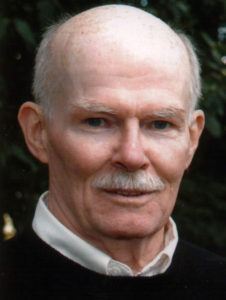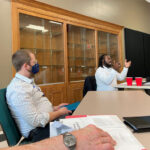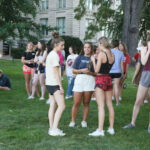By Frank Wessling
When it looks like water in the glass, and I’m expecting water to drink, it’s disorienting to get a mouthful of gin. It wasn’t gin or water that upset expectations around me this past Christmas day, but a rupture in routine at Mass.

I had noticed a little family of two boys and an adult couple in a front pew as Mass went on. Both boys were neatly dressed in white dress shirts and slacks. One, at the center aisle end of the pew, appeared to be a young teenager, the other one maybe 10 years old.
I happened to be a eucharistic minister at that Mass. In the breakout of roles at Communion time, I wound up beside the celebrant with the body of Christ at the head of the center aisle looking at that teenager and realizing we had one of those Christmas and Easter situations but hadn’t prepared for it. The front pew family wasn’t moving; the teenager looked blank, lost. No one moved behind them. Meanwhile, people in the pews on the other side were moving in a steady Communion procession, as we now call it.
That boy in the white shirt finally did move out and stepped toward me, still looking blank, hands down at his sides, clearly uncomfortable, not knowing what was going on or why he was even standing there. I quietly asked him if he was receiving Communion; he simply looked at me silently.
Now I was beginning to feel unmoored, but the boy saved me by turning and moving to the side as I assume he noticed people doing in the other line. The other boy and the man followed and turned aside. By the time the woman stood in front of me I was finally able to touch her and offer a word of blessing. The pews on my side were then emptying as people filed out into the aisle in the usual orderly fashion and came forward in the usual way, some carrying babies, a few young children and a couple of adults with arms crossed in front of them in the expected sign of No Communion, a very few receiving on the tongue rather than in cupped hands, until the last person had received the host and turned away.
One more Communion procession on almost any Christmas or Sunday completed. But it wasn’t over for me. The experience of that family had not been what we want for people who visit us for worship.
Since they were in the front pew, it was easy to approach the family at the end of Mass. I apologized for the awkwardness and confusion at Communion time. The woman didn’t think an apology was needed. She explained that they were Evangelical Protestant, and said she thought the “service was beautiful.” I explained our crossed arms signal at Communion time, we chatted a bit, and I felt better.
We aren’t necessarily prisoners of our expectations, but we certainly depend on them for comfort. All kinds of expectations were shaken in that Communion experience. I expected folks to have at least some knowledge of what goes on in the Mass, especially if they come up to the front pew. That family, especially the two boys, apparently did not expect any performance to be required from them. Folks in the pews behind expected the people in front of them to move out first for Communion.
And from another perspective, I approached that family after Mass because I expected them to be gracious, which they certainly were.
I hope they went home feeling some sense of reciprocal grace; perhaps a little wine of compassion, not gin.
(Frank Wessling previously served as news editor of The Catholic Messenger.)











